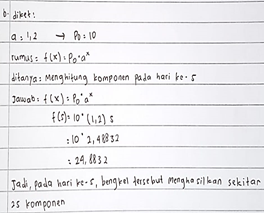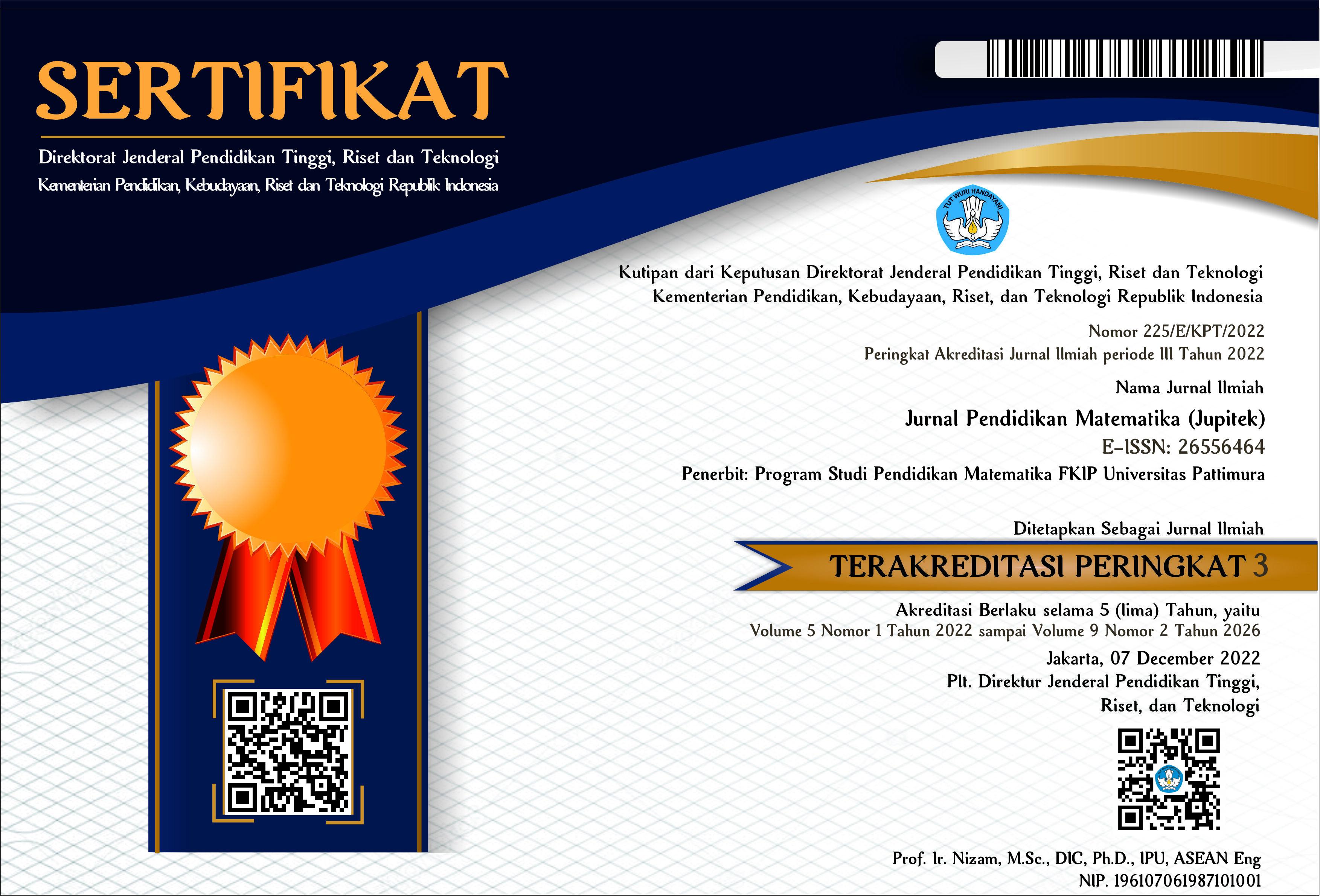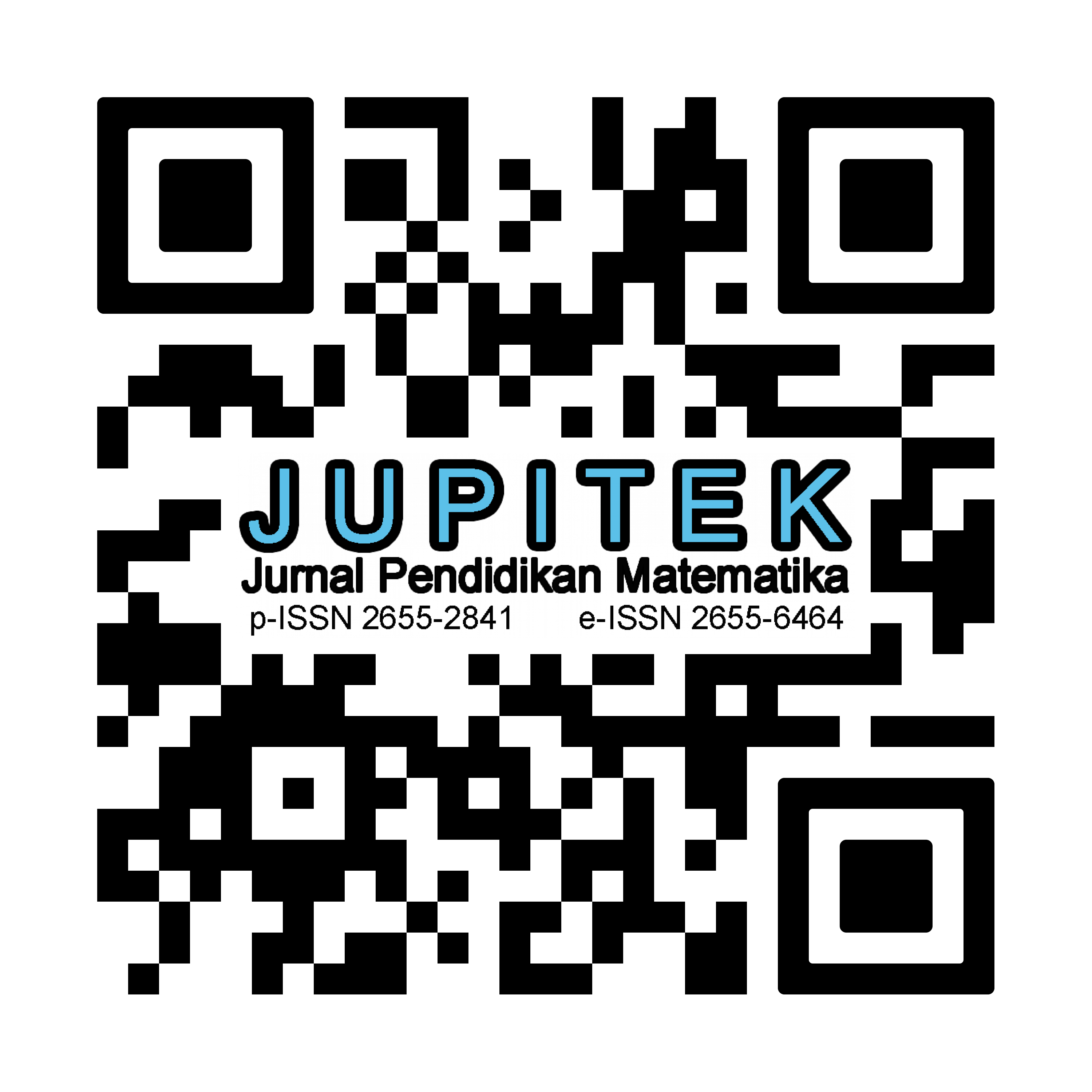Mathematical Literacy Problems in Exponential Material Based on Vocational Students’ Self-Regulated Learning
Abstract
This study explores the mathematical literacy challenges faced by students at SMK Negeri 2 Bawang, Banjarnegara Regency, in learning exponential concepts, which are analyzed through the lens of the Independent Regular Learning (SRL) level. Using a descriptive qualitative approach, this study involved three student subjects representing high, medium, and low SRL categories. Data was collected through mathematical literacy tests, SRL questionnaires, and interviews. The research findings indicate that variations in SRL levels significantly influence the types of difficulties students experience. Students with low SRL face various challenges, including understanding the context of the problem, building mathematical models, and interpreting results. Students with moderate SRL demonstrate the ability to understand problems but have difficulty selecting appropriate problem-solving strategies and accurately representing contextual situations in mathematical form.
Meanwhile, students with high SRL exhibit systematic and reflective thinking but encounter obstacles connecting mathematical outcomes to real-life contexts. These findings underscore the role of SRL in shaping students' mathematical literacy challenges. Further research is recommended to investigate additional internal factors that influence mathematical literacy in order to develop more adaptive and targeted teaching strategies
Downloads
References
Afrizal. (2023). Analisis Literasi Matematis Siswa SMP dalam Menyelesaikan Soal Pemecahan Masalah Ditinjau dari Self Regulated Learning. Universitas Islam Negeri Ar-Raniry.
Apriliska, S., Efendi, C. S., Priangka, N. A., & Kurniati, N. (2025). Systematic Literature Review: Faktor Internal yang Memengaruhi Literasi Matematika Siswa di Indonesia. Griya Journal of Mathematics Education and Application, 5(2), 164-180. https://mathjournal.unram.ac.id/index.php/Griya/index
Aripin, U., Rosmiati, T., Pitriyani, W., & Fauzi, F. (2024). Solving Smartphone Storage Management Problems: Students’ Mathematical Literacy Based on Self-Regulated Learning. Edumatika: Jurnal Riset Pendidikan Matematika, 7(1), 31-44. https://doi.org/10.32939/ejrpm.v7i1.3614
Anggraeni, S. T., Muryaningsih, S., & Ernawati, A. (2020). Analisis Faktor Penyebab Kesulitan Belajar Matematika Di Sekolah Dasar. Jurnal Riset Pendidikan Dasar (JRPD), 1(1), 25–37. https://doi.org/10.30595/.v1i1.7929
Aritonang, I., & Safitri, I. (2021). Pengaruh Blended Learning Terhadap Peningkatan Literasi Matematika Siswa. Jurnal Cendekia : Jurnal Pendidikan Matematika, 5(1), 735–743. https://doi.org/10.31004/cendekia.v5i1.555
Burkhardt, H., Pead, D., & Stacey, K. (2024). Learning and Teaching for Mathematical Literacy: Making Mathematics Useful for Everyone. Routledge.
Cardoso Espinosa, E. O. (2021). Developing mathematical literacy in the context of the fourth industrial revolution. IGI Global.
Friska, D. F. (2024). Analisis Literasi Matematis Siswa ditinjau dari Self Regulated Learning pada Pembelajaran Problem Based Learning (PBL) Berbasis E-Modul. Euclid, 11(1), 33-54. https://doi.org/10.33603/cpt2nq30
Gabriel, F., Buckley, S., & Barthakur, A. (2020). The impact of mathematics anxiety on self-regulated learning and mathematical literacy. Australian Journal of Education, 0(0), 1–15. https://doi.org/10.1177/0004944120947881
Kholifasari, R., Utami, C., & Mariyam, M. (2020). Analisis kemampuan literasi matematis siswa ditinjau dari karakter kemandirian belajar materi aljabar. Jurnal Derivat: Jurnal Matematika Dan Pendidikan Matematika, 7(2), 117-125. https://doi.org/10.31227/osf.io/9t4rk
Indriani, A., & Wahyuni, S. (2022). Peningkatan Literasi Matematis dan Perubahan Self Regulated Learning Siswa Melalui Model Problem Based Learning dengan Pendekatan Realistic Mathematics Education. Jurnal Pendidikan Matematika Indonesia, 7(1), 12–25. http://repository.upi.edu/
Mahajani, R., Hulukati, E., & Oroh, F. A. (2024). Analisis Kemampuan Literasi Matematika Siswa Kelas X Dalam Menyelesaikan Soal Higher Order Thinking Skills (HOTS) Pada Materi Sistem Persamaan Linear Tiga Variabel. Mathema Journal, 6(2), 424–436. https://doi.org/10.33365/jm.v6i2.3387
Maysarah, S., Saragih, S., & Napitupulu, E. (2023). Peningkatan Kemampuan Literasi Matematik Dengan Menggunakan Model Project-Based Learning. AKSIOMA: Jurnal Program Studi Pendidikan Matematika, 12(1), 1536. https://doi.org/10.24127/ajpm.v12i1.6627
Nurvicalesti, N., Walid, Dewi, N. R., & Adhi, N. (2021). Mathematics literacy skill seen from self-regulated learning (SRL) in SQ4R learning with mathematics realistic approach. Unnes Journal of Mathematics Education Research, 10(1), 68–74. http://journal.unnes.ac.id/sju/index.php/ujmer
OECD. (2023). PISA 2022 results (Volume I & II): Country notes – Indonesia. OECD Publishing. https://www.oecd.org/en/publications/pisa-2022-results-volume-i-and-ii-country-notes_ed6fbcc5-en/indonesia_c2e1ae0e-en.html
Putri, R. D. R., Ratnasari, T., Trimadani, D., Halimatussakdiah, H., Husna, E. N., & Yulianti, W. (2022). Pentingnya Keterampilan Abad 21 dalam Pembelajaran Matematika. Science and Education Journal (SICEDU, 1(2), 449–459. https://doi.org/10.31004/sicedu.v1i2.64
Qomaruddin, Q., & Sa’diyah, H. (2024). Kajian Teoritis tentang Teknik Analisis Data dalam Penelitian Kualitatif: Perspektif Spradley, Miles dan Huberman. Journal of Management, Accounting, and Administration, 1(2), 77–84. https://doi.org/10.52620/jomaa.v1i2.93
Rahmayanti, E., Sukestiyarno, Y., & Zaenuri, Z. (2024). Analisis Literasi Matematika Soal Hots Ditinjau Dari Kemandirian Belajar Siswa Kelas X Sma. Anargya: Jurnal Ilmiah Pendidikan Matematika, 6(2), 129–139. https://doi.org/10.24176/anargya.v6i2.12020
Rizqa, M., Irawan, A., Risnawati, R., & Husni, R. (2023). Analisis Kemampuan Literasi Matematis Siswa Ditinjau dari Self Regulated Learning Siswa SMP. Tarbiyah Suska Conference Series, 2(1), 85–96.
Santika, A., & Khotimah, R. (2023). Analisis Kemampuan Literasi Matematika Siswa SMP dalam Menyelesaikan Soal PISA Konten Quantity Ditinjau Dari Self-Regulation. Jurnal Cendekia : Jurnal Pendidikan Matematika, 7(2), 1103-1117. https://doi.org/10.31004/cendekia.v7i2.2359
Sapulete, L., Laurens, T., & Gaspersz, M. (2023). The effect of self-regulated learning and self-efficacy on student’s solving problem ability. JUPITEK: Jurnal Pendidikan Matematika, 6(2), 114–122. https://doi.org/10.30598/jupitekvol6iss2pp114-122
Sumarni, E., Jupri, A., & Juandi, D. (2025). Research trends in mathematical literacy and self-regulated learning: A scoping review using bibliometric analysis. Jurnal Gantang, 10(1), 31–44. https://doi.org/10.31629/jg.v10i1.6916
Tuti, D. S., Triyanto, & Nurhasanah, F. (2025). Analisis kemampuan literasi matematika siswa SMP pada materi geometri ditinjau dari self-regulated learning. Jurnal Manajemen Pendidikan Islam dan Sains (JMPIS), 6(4), 3078–3089. https://doi.org/10.38035/jmpis.v6i4
Wang, Y., & Sperling, R. A. (2020). Characteristics of effective self-regulated learning interventions in mathematics classrooms: A systematic review. Frontiers in Education, 5, 58. https://doi.org/10.3389/feduc.2020.00058
Wijayanto, Z., Wardono, Sukestiyarno, Y., & Yani, E. (2024). Analisis Kemampuan Literasi Matematika Siswa SMP ditinjau dari Self Regulated Learning. PRISMA, Prosiding Seminar Nasional Matematika, 7(2), 663–669. https://doi.org/10.33365/jm.v6i2.3387
Yanti, I., Asiani, R. W., & Kukuh, M. (2022). Students' mathematical literacy in solving higher order thinking skill problems on matrix material. JUPITEK: Jurnal Pendidikan Matematika, 5(2), 175–186. https://doi.org/10.30598/jupitekvol5iss2pp175-186
Zimmerman, B. J. (2002). Becoming a self-regulated learner: An overview. Theory into practice, 41(2), 64-70.

Copyright (c) 2025 Yolanda Pratiwi, Kusno Kusno, Fitrianto Eko Subekti

This work is licensed under a Creative Commons Attribution-NonCommercial-ShareAlike 4.0 International License.
License and Copyright Agreement
By submitting a manuscript to Jurnal Pendidikan Matematika (JUPITEK), the author(s) certify and agree to the following terms:
- Originality and Authority: The submitting author is authorized by all co-authors to enter into this agreement. The manuscript describes original work that has not been published previously in a peer-reviewed journal, nor is it under consideration for publication elsewhere.
- Approval: Its publication has been approved by all author(s) and by the responsible authorities of the institutions where the work was carried out.
- Rights: The authors secure the right to reproduce any material that has already been published or copyrighted elsewhere.
- Licensing and Copyright: Authors retain the copyright to their work.
- License Grant: The authors grant Jurnal Pendidikan Matematika (JUPITEK) the right of first publication, with the work simultaneously licensed under the Creative Commons Attribution-NonCommercial-ShareAlike 4.0 International (CC BY-NC-SA 4.0).
- Self-Archiving: Authors are permitted and encouraged to deposit the published version of their article in institutional repositories, on their personal websites, and other academic platforms, with proper acknowledgment of its initial publication in Jurnal Pendidikan Matematika (JUPITEK).





.png)


